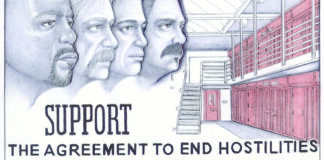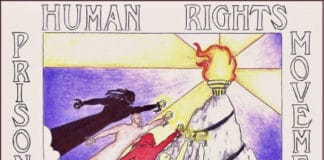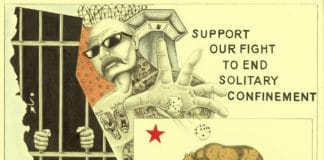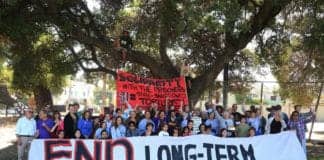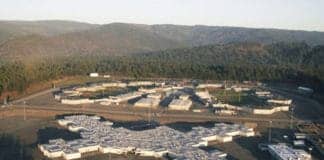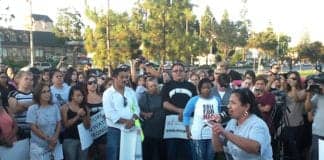Tags Antonio Guillen
Tag: Antonio Guillen
Agreement to End Hostilities
The Agreement to End Hostilities, envisioned and written by the Best of the Best, is perhaps the most powerful document to be created in the past 50 years, a testament to the power of unity, and today a Blueprint for the possibilities for humanity globally.
Liberate the Caged Voices: Where’s the humanity?
“Where is the humanity in that?” asks Nube Brown who pulls the lens in tight on the inhumane policies of the Prison Industrial Slave Complex perpetrated on all human beings suffering prison atrocities of torture, dehumanization, exploitation, extraction, starvation, death by health neglect and physical abuse, while making billions off the backs of those they hold captive.
Liberate our elders! California Prison Focus demands Gov. Newsom protect peacemakers...
Support demands by CPF and the Prisoner Human Rights Movement that Gov. Newsom release all state prisoners who are medically fragile or over 60, starting with the authors of the Agreement to End Hostilities and followed by the remaining members of the Ashker Class Action Settlement.
In our fifth year of the Agreement to End Hostilities, it’s...
We are within our fifth year of the August 2012 historical document, the “Agreement to End Hostilities.” Its release was followed by the Prisoner Human Rights Movement’s third and largest hunger strike in the state of California and larger than any prison hunger strike in history in either the federal or state prison systems in the U.S. or anywhere else in the world. At its peak, 30,000 prisoners here in California participated – prisoners in solitary confinement and the general population.
Prisoner Human Rights Movement Blue Print
CDCr has systemic and dysfunctional problems that run rampant statewide within California’s prisons for both women and men which demand this California government to take immediate action and institute measures to effect genuine tangible changes throughout CDCr on all levels. The Prisoner Human Rights Movement Blue Print is essentially designed to deal with identifying and resolving primary contradictions by focusing on the various problems of CDCr’s dysfunction.
Pelican Bay Hunger Strike: Four years and still fighting
Four years ago prisoners in California – led by those in the control units of Pelican Bay – organized a hunger strike to demand an end to the torturous conditions of solitary confinement. Two more strikes would follow, with over 30,000 prisoners taking united action in the summer of 2013 – both in isolation and in general population in nearly every California prison. Current prison organizing continues a historic legacy of struggle.
The Agreement to End Hostilities must be re-implemented in all California...
It has been two years since our Agreement to End Hostilities was released in October 2012, and we continue to stand united. While there have been a few conflicts here and there, we need to commit to ceasing all racial hostilities towards one another and remain peacefully united throughout all prison facilities. By re-reading and re-committing ourselves to the Agreement to End Hostilities, we are taking back control of our own lives and our own futures.
California prisoner representatives: All people have the right to humane treatment...
We are the prisoner class representatives of what’s become known as the PBSP SHU Short Corridor Collective Human Rights Movement. Last month we marked the first anniversary of the end of our historic 60-day Hunger Strike. Oct. 10 we mark the two-year anniversary of the Agreement to End Hostilities. This is an update on where things stand with our struggle to achieve major reforms beneficial to prisoners, outside loved ones and society in general.
SB 892: Letter from four main reps at Pelican Bay to...
On May 1, 2014, we, California inmates who have been in solitary confinement for long periods of time, co-signed a letter addressed to the California Senate and Assembly expressing our grave concerns with Sen. Hancock’s SB 892. We wish to follow up on our previous letter, as SB 892 has now been approved by the Senate and is being considered in the Assembly.
Prisoners and advocates commemorate the one-year anniversary of the hunger strike...
A year ago on July 8, over 30,000 people inside California prisons began a hunger strike to bring an end to the state’s use of indefinite solitary confinement. On the one-year anniversary of the largest prisoner hunger strike in California history, the Center for Human Rights and Constitutional Law today is filing a lawsuit charging CDCR with illegally refusing to publicly disclose information, data and studies regarding its solitary confinement rules, policies and practices.
Largest hunger strike in history: California prisoners speak out on first...
One year ago, on July 8, 2013, 30,000 California prisoners initiated the largest hunger strike the world has ever seen. Sixty days later, 40 prisoners, who had eaten nothing in all that time, agreed to suspend the strike when state legislators promised to hold hearings on ending solitary confinement, the heart of their demands. The 2013 hunger strike followed two in 2011. In the interim, effective October 2012, the hunger strike leaders, representing all racial groups, issued the historic Agreement to End Hostilities, which has held with few exceptions throughout the California prison system ever since.
Calipatria riots need to cease and unity needs to spread
Men at Calipatria on general population yards A, B and C can show the same courage as the hunger strikers, who are honored around the world, by pledging to respect the Agreement to End Hostilities and stop all fighting and riots between racial groups. The Agreement must continue to hold within all California prisons and unity needs to spread across the state. Only then can justice be won.
SB 892 and AB 1652: Pelican Bay prisoner representatives speak to...
We are writing to offer our position on the two bills pending before the Assembly and the Senate – SB 892 and AB 1652 – dealing with the solitary confinement and gang validation policies of the California Department of Corrections and Rehabilitation (CDCR). The narrower and more focused (and less costly) AB 1652 would far better serve the public safety, prison security and the humane treatment of prisoners.
Antonio Guillen: May Day message to the working class people of...
I am one of the hunger strike representatives from Pelican Bay State Prison. I along with my family are also part of the working class people of America. As a young boy, I’d watch my parents in their daily struggles. Even now, while I’m in prison, my wife and children are part of the daily grind that is the work force!
Prisoners and advocacy groups oppose Sen. Loni Hancock’s prison reform bill,...
California prisoners, who suspended their 2013 hunger strike, the largest such strike in history, after two legislative leaders promised bills addressing the strikers' demands, are now opposing one of those bills. Sen. Loni Hancock's Senate Bill 892 would give prison regulations on “gang validation” and the new step-down program the force of law. And it would leave California with the largest population of prisoners in solitary confinement of any country in the world or state in the United States at enormous cost to the taxpayers.
Lawyers Guild honors prison hunger strikers
On the evening of April 5, hundreds gathered in downtown Oakland for the National Lawyers Guild San Francisco Bay Area Chapter’s (NLGSF) annual fundraising dinner. This year, the NLGSF honored California prison hunger strikers and the Prisoner Hunger Strike Solidarity (PHSS) coalition of family members, activists and friends who supported the strikers. The assembled crowd was able to hear directly from those inside California prisons.
‘Condemned’ by Keith LaMar (Bomani Shakur)
I’m reaching out to inform you all that I finally finished my book, “Condemned.” This book isn’t just about me or about what happened to these men after a prison uprising. It’s about all of us. What happened to me can happen to you. Especially if you are poor. Especially if you are a minority. Especially if you are alone ... or at least feel that you’re alone.
Pelican Bay Short Corridor Human Rights Movement: Banned testimony of the...
This is our banned testimony: There is no reason California can’t run very high security prisons that allow prisoners held in segregation to have contact visits with family, phone calls to family and friends, educational and rehabilitation programs, more out-of-cell time, cells with windows, recreational yards that allow for small groups to recreate together and see the outside world: in short, segregation from the general population, but not torture or dehumanization. It’s time for California to do the right thing. It’s time for the legislature to enact meaningful reforms.
Prison hunger strikers face reprisals as papers that back them are...
Since some 30,000 California prisoners launched a hunger strike July 8 against the practice of long-term solitary confinement and other abuses, participants have faced punitive retaliation and censorship of newspapers and other media that backed their fight. Abuses continued after prisoners suspended the strike Sept. 5.
Message from Pelican Bay prisoner representatives to UN Special Rapporteur on...
We, the four principal representatives of the prisoners confined in the Security Housing Unit (SHU) at Pelican Bay State Prison, hereby welcome Juan Méndez to California. We have followed your work and advocacy against torture throughout the world and congratulate you on your commitment and success in bringing your findings to the public’s attention. As a former prisoner yourself, we would like you to do your best to bring both our conditions and our human rights movement to the attention of the international community.

 Store
Store



